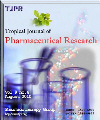
|
Tropical Journal of Pharmaceutical Research
Pharmacotherapy Group, Faculty of Pharmacy, University of Benin, Benin City, Nigeria
ISSN: 1596-5996
EISSN: 1596-5996
Vol. 16, No. 6, 2017, pp. 1285-1292
|
 Bioline Code: pr17164
Bioline Code: pr17164
Full paper language: English
Document type: Research Article
Document available free of charge
|
|
|
Tropical Journal of Pharmaceutical Research, Vol. 16, No. 6, 2017, pp. 1285-1292
| en |
Okra ( Abelmoschus esculentus  Linn) inhibits lipopolysaccharide-induced inflammatory mediators in BV2 microglial cells Linn) inhibits lipopolysaccharide-induced inflammatory mediators in BV2 microglial cells
Mairuae, Nootchanat; Cheepsunthorn, Poonlarp; Cheepsunthorn, Chalisa Louicharoen & Tongjaroenbuangam, Walaiporn
Abstract
Purpose: To investigate the inhibitory effects of okra (Abelmoschus esculentus Linn.) extract on the
production of reactive oxygen species (ROS) and pro-inflammatory cytokines in lipopolysaccharide
(LPS)-stimulated BV2 microglia.
Methods: Okra was extracted with ethanol by Soxhlet extraction. Non-cytotoxic doses of okra at
concentrations of 50, 100 and 200 μg/mL were used in this study. BV2 cells were cultured and treated
with LPS in the presence or absence of okra at the concentrations indicated above. ROS, nitric oxide
(NO), tumor necrotic factor alpha (TNF-α), interleukin 1 beta (IL-1β), phosphorylation levels of nuclear
factor-kappa B (NF-kB) p65 and Akt were determined.
Results: Treatment of BV2 cells with okra concentrations of 50, 100 and 200μg/mL significantly
suppressed LPS-induced NO as well as ROS compared to untreated cells. There was also a significant
decrease in the production of TNF-α and IL-1β in okra-treated BV2 microglia cells. The level of LPSinduced
NF-kB p65 phosphorylation was significantly decreased by okra treatment. In addition, okra
inhibited LPS-induced Akt phosphorylation, which is an upstream molecule of NF-kB.
Conclusion: Okra exerts anti-oxidative and anti-inflammatory effects in LPS-stimulated BV2 microglial
cells by suppressing Akt-mediated NF-κB pathway. This suggests that okra might be a valuable agent
for the treatment of anti-neuroinflammatory diseases mediated by microglial cells.
Keywords
Abelmoschus esculentus Linn; Inflammatory cytokines; Lipopolysaccharide; Neuroinflammation; Microglia; Reactive oxygen species
|
| |
© Copyright 2017 - Pharmacotherapy Group, Faculty of Pharmacy, University of Benin, Benin City, 300001 Nigeria.
Alternative site location: http://www.tjpr.org
|
|
